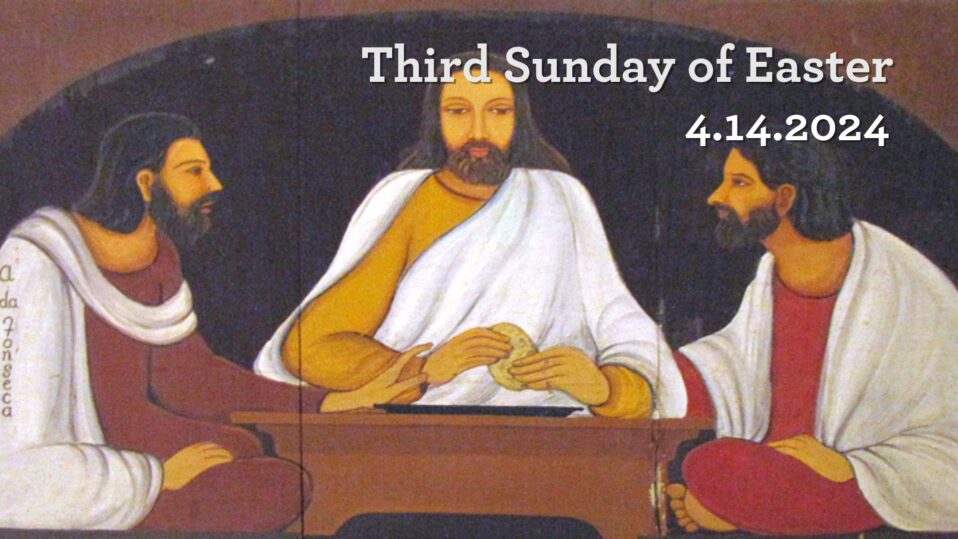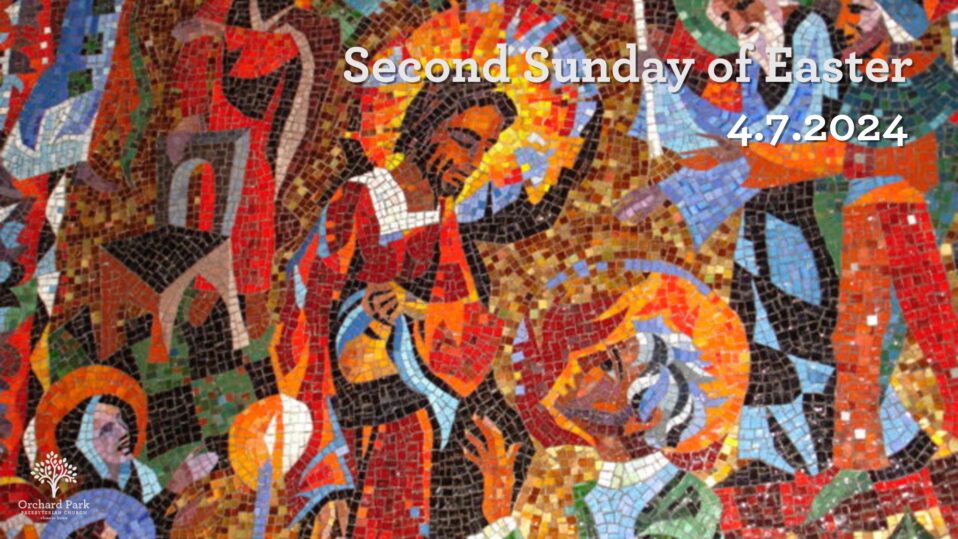Last weekend we drove down to southern Indiana for a family wedding. Once you get out of the construction and traffic, there’s not much to see except for an occasional hawk, bright red barns, and billboards. Lots and lots of billboards – and most of them, if they aren’t telling us that crackle barrel is at the next exit, were telling us something about Jesus. Most of them were a little threatening, some of them went as far as condemning, and all of them were proselytizing.
I was struck by how many of them focused on John 3:16. There are a lot of Bible verves that would make a good slogan for a billboard-
“consider the lilies,” “Be not afraid,” Or one for I-65, “Get behind me Satan”
It’s interesting that John 3:16, God so loved the world, that he sent his son, to die for our sins, was remade with different backgrounds, all of them with pictures of Jesus with his locks of well conditioned hair, forever looking about 29 years old, his face portraying a mixture of judgment and watchfulness was the billboard choice.
Do the billboard people know the context for this passage? Do they know it comes from the Gospel of John – a gospel written for a community that was trying to understand Jesus, having never personally known Jesus – a community that was trying to understand Jesus’ teachings while also practicing their Jewish traditions. – A community that would have a lot people who would identify with Nicodemus.
Nicodemus was a highly reputable, respected Pharisee in the community. He was awarded the who’s who in journal of Phariesees and got noted with 30 under 30 and 40 under 40. He was the guy people went to, to get the answers. Nicodemus would like to hold that reputation, and so he goes to see Jesus in the night. I imagine he came in a ball cap and hoody to not be recognized, came in and slipped out through the back door. While all of this visiting was incognito, it seems to me his fellow colleagues knew he was coming to pay this visit. His secrecy was to protect him from being seen by those who be going to him with questions. Although the Gospel doesn’t say it, I have a feeling that Nicodemus was sent by the Pharisees as their liaison. They had all been talking you see, trying to figure out this man called Jesus. Based on the evidence, they all agreed that he was a man from God, that he was a miracle worker. – But they have some questions, so they send Nicodemus.
Nicodemus says to Jesus, this is what we know, Rabbi, we know that you are a teacher who has come from God; for no one can do these signs that you do apart from the presence of God.”
3:3 Jesus answered him, “Very truly, I tell you, no one can see the kingdom of God without being born from above.”
It’s like Jesus avoids the niceties and goes right to reason Nicodemus is really there. It’s like he knows the real question he has come to ask and so he gives him the answer before Nicodemus asks.
No one can see the kingdom of God without being born of above.
Nicodemus is a scholar and a pharisee. He has lived his life finding answers in books and order in rules. He’s a literalist and so he asks a literal question – how can someone be born twice?
Just how were you supposed to pull a thing like that off? How especially were you supposed to pull it off if you were pushing sixty-five? How did you get born again when it was a challenge just to get out of bed in the morning? He even got a little sarcastic. Could one “enter a second time into the mother’s womb?” he asked (John 3:4),
A gust of wind happened to whistle down the chimney at that point, making the dying embers burst into flame, and Jesus said being born again was like that. It wasn’t something you did. The wind did it. The Spirit did it. It was something that happened, for God’s sake.
“How can this be?” Nicodemus asked (John 3:9), and that’s when Jesus really got going.
Jesus looks at him like, maybe he needs to explain what a metaphor is, but he takes a deep breath says, “God so loved the world that he gave his only Son, so that everyone who believes in Him may not perish but have eternal life (The Greek word for “perish” also means “become lost”—so it’s a matter of being lost, not punishment). Indeed, God did not send the Son into the world to condemn the world, but in order that the world might be saved through him.” (John 3:16,17)
Jesus says two things here, why he didn’t come and why did come. He did not come to condemn the world. The purpose of Jesus coming to the world was not to bring about condemnation. It wasn’t to threaten, intimidate, or demean.
I wonder how many people who aren’t Christian and only know Christianity and the church by its repuatation or have left church because they were told they were condemned to hell believe that? This leads to the second part of Jesus’ answer. Jesus says he did not come to condemn, but to save and that saving is done by having a rebirth experience. Nicodemus is so confused. Is there manual for this?
Nicodemus comes looking for certainty, Jesus gives him mystery. The mystery—the transcendence—the reality of God which we mean when we use the term Holy Spirit. It is the the acknowledgement that there is a reality greater than us, greater even than our ability to comprehend. God, God transcendent, and mysterious, and holy—to whom we are accountable. God is God precisely in our inability to comprehend and get it all pinned down, finally, ultimately, absolutely
Krista Tippett writes, In the century now past, certain kinds of religiosity turned themselves into boxes into which too little wondering could enter or escape. So did certain kinds of nonbelief. But this I believe: Any conviction worth its salt has chosen to cohabit with a piece of mystery, and that mystery is at the essence of the vitality and growth of the thing.
Einstein saw a capacity for wonder, a reverence for mystery, at the heart of the best of science and religion and the arts. And as this century opened, physicists, cosmologists and astronomers were no longer pushing mystery out but welcoming it back in. Physics came to the edge of what it thought to be final frontiers and discovered, among other premise-toppling things, that the expansion of the universe is not slowing down but speeding up. It turns out that the vast majority of the cosmos is brim full of forces we had never before imagined and cannot yet fathom—the intriguingly named dark matter, as well as dark energy.
James Carse writes about the mystery of a “ragged line of wild geese in the gray November sky and the certain knowledge that no one knows exactly what they are doing there.” Carse says, “the mind does not come alive until it meets what it cannot comprehend.” (See Daybook, Autumn 1999, from “The Mysticism of Ordinary Experience,” p. 29–31)
The great British journalist, Malcolm Muggeridge, after a life of skepticism, became a believer when he saw God’s unconditional love for the world in Mother Teresa’s love for the homeless and dying on the streets of Calcutta. Muggeridge wrote later:
‘It sounds crazy, as it did to Nicodemus who asked how it was possible to be born again. Yet it happens: it has happened innumerable times. Suddenly caught up in the wonder of God’s love flooding the universe, made aware of the stupendous creativity that animates all life—every color brighter, every shape more shapely, every meaning clearer, every note more musical, above all, every human face, all human companionship, recognizably a family affair—all irradiated with the same new glory in the eyes of the newly born.” (Christ and the Media, p.74,75)
God so loved the world that he gave his only Son, that everyone who believes—believes the reality of a transcendent God, believes and receives and lives in the reality of God’s unconditional love—shall not be lost—but have life everlasting.
What does it mean that God so loved the world?
God, who needs nothing, loves into existence wholly superfluous creatures in order that He may love and perfect them
To believe that God so loved the world is an astonishing assertion that the mysterious transcendent reality behind all reality—loves us, wants us, wants full and joyful life for us, loves us with a love from which nothing can ever separate us, a love in which we are never completely lost.
God so loved the world—and that, I gladly confess, continues to startle me and astonish me and sustain me. That God should love you and me.
That God sent Jesus, not to condemn me, you, but to free us for full and exuberant and joyful life.
How can this be, Nicodemus asked, and we echo—How can this be?
It can only be, because of love. God loves us not because we are loveable but because He is love. And because He is love, He can only will what is best for us, which is to be transformed into a being of holy love like Himself. He will settle for nothing less. As we meditate on God’s love for us, especially in the cross of Christ, our love for God and our neighbor will increase, and our hearts will become more and more like God’s — filled with love.
“Therefore, if anyone is in Christ, he is a new creation. The old has passed away; behold, the new has come.”
How can this be? It’s a mystery. Thanks be to God.
Amen,
Rev. Dr. Shelly Wood



